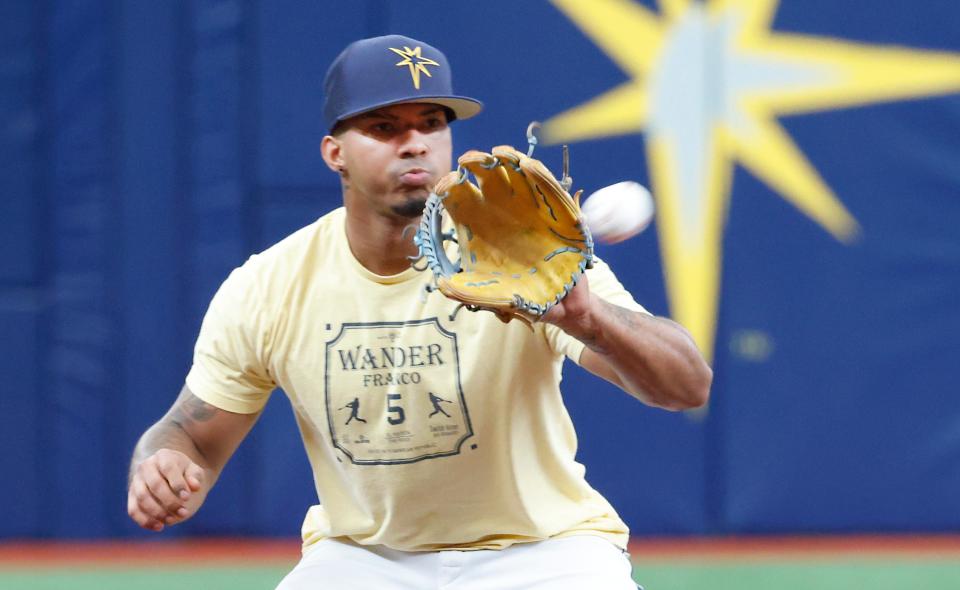MLBPA rejects MLB's international draft proposal; veteran players still subject to qualifying offer
The MLB Players' Association rejected Major League Baseball's final offer for an international draft Monday, a move that maintains current conditions for both unsigned free agents in Latin America as well as MLB veterans who can remain tethered to a qualifying offer when they reach free agency.
Wrapping up the final significant piece of business from collective bargaining negotiations that resulted in a 99-day MLB lockout, the MLBPA faced a Monday deadline to agree to an international draft or have veteran free agents remain subject to a qualifying offer, which this past off-season meant a one-year, $18.4 million tender. Players who reject the qualifying offer become free agents, but their old teams receive draft-pick compensation if they leave, a stipulation that has been a drag on mid-level free agents in recent winters.
But the MLBPA viewed an international draft as too large a chip to trade in exchange for eliminating draft-pick compensation, particularly since the number of veterans drastically affected in a given year is five or fewer. Additionally, it viewed MLB's offer — increased from $181 to $191 million in guaranteed bonuses for a 20-round draft, plus $6 million more for undrafted free agents, compared to the union's $260 million ask — insufficient to upend a system in which corruption is rampant but the free market still reigns.
A person with direct knowledge of the offer confirmed the figures to USA TODAY Sports. The person spoke on condition of anonymity because negotiations were ongoing.

While signees hailing largely from the Dominican Republic and Venezuela are typically younger — 16 or 17 years old — and less developed than American-born high school and college draftees, the MLBPA feared a system in player procurement that greatly favored domestic players and resulted in decreased interest in foreign-born players.
"We made proposals to compensate international signees more fairly and in line with other amateurs," the MLBPA said in a statement, "and to ensure that all prospects have access to an educational and player development safety net.
"At their core, each of our proposals was focused on protecting against the scenario that all Players fear the most — the erosion of our game on the world stage, with international players becoming the latest victim in baseball's prioritization of efficiency over fundamental fairness."
BUY OR SELL?: Five MLB teams with big decisions to make as trade deadline approaches
POWER RANKINGS: Second half starts ahead of potential blockbuster trade deadline
NEWSLETTER: Sign up now to get daily sports updates sent to your inbox
Player acquistion has been rife with corruption in the Dominican Republic, with the league and players both hoping to minimize negative effects wrought by occasionally unscrupulous buscones — or player agents — who might claim an inappropriate amount of a player's eventual signing bonus, strike agreements with clubs years before a player is eligible or provide them performance-enhancing drugs to improve their marketability.
MLB has increased efforts to deter improprieties, but sanctioning or even banning for life rule-breaking scouts or high-ranking officials has not deterred improper activity in the manner it believes an international draft might.
Dominican players have been outspoken against an international draft, with a greater concern their island country may suffer a fate similar to Puerto Rico, which saw its status as a talent hotbed diminish since 1990, when MLB subjected players from that U.S. commonwealth to the draft.
Two Venezuelan stars, Carlos Guilen and Bobby Abreu, have spoken in favor of an international draft, citing a greater ability to control and foster player development. Guillen operates an academy in Venezuela.
MLB believes its offer to raise the overall international signing pool from $167 million to $191 million, along with enacting a system with potential to curb improprieties and reduce and perhaps eliminate pre-draft agreements, was sufficient.
"MLB worked to reach an agreement with the MLBPA to reform the international amateur system in ways that would address longstanding challenges and benefit future players," MLB said in a statement. "We are disappointed the MLBPA chose the status quo over transitioning to an international draft that would have guaranteed future international players larger signing bonuses and better educational opportunities, while enhancing transparency to best address the root causes of corruption in the current system.”
The lockout marked the first work stoppage over CBA negotiations since the 1994-95 strike, although a last-minute settlement in March and a subsequent adjustment to the schedule meant the league did not lose any regular season games to the lockout. A truncated and month-delayed spring training followed the March CBA agreement, a process both sides won't need to reengage with until December 2026.
Still, issues such as drug testing or the international draft can be reopened during the five-year term, and commissioner Rob Manfred can unilaterally implement rule changes with 45 days' notice; MLB is expected to enact a pitch clock, a curb on defensive shifts, and larger bases in 2023.
This article originally appeared on USA TODAY: MLB news: MLBPA rejects international draft proposal. What it means

